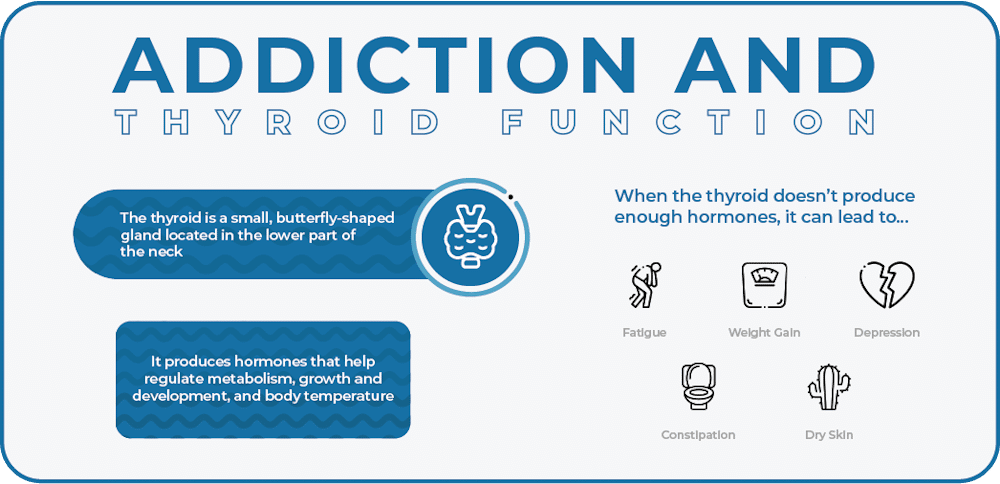The connection between addiction and thyroid function is an important one to consider; it can have a profound impact on overall health. When the subject of addiction comes up, it doesn’t seem as though thyroid function would be related. However, there are plenty of reasons thyroid function could be affected by substance use disorder.
What Is Addiction?
Substance use disorder, also known as addiction, is a mental health condition characterized by an individual’s recurrent use of substances such as alcohol or drugs. Substance use disorders can range from mild to severe and often lead to physical and psychological dependence. Symptoms of substance use disorder may include cravings for the substance, difficulty controlling one’s use of the substance, continued use despite negative consequences, and impaired functioning in everyday life.
What Is the Thyroid?
The thyroid is a small, butterfly-shaped gland located in the lower part of the neck. It produces hormones that help regulate various body functions including metabolism, growth and development, and body temperature. When the thyroid doesn’t produce enough hormones, it can cause health problems such as fatigue, weight gain, depression, dry skin, and constipation. If the thyroid produces too many hormones, it can cause problems such as rapid weight loss, insomnia, and palpitations.
Thyroid disorders are very common and affect millions of people around the world. Treatment for thyroid disorders typically involves a combination of medications, lifestyle changes, and surgery. Diagnosis is made through blood tests and imaging studies. With proper treatment and support, thyroid disorders can be managed effectively. By understanding how the thyroid works and knowing the signs and symptoms of thyroid disorders, people can take steps to protect their health.
How Does Alcohol Impact the Thyroid?
Alcohol is known to have a negative impact on the thyroid and its associated hormones. Long-term alcohol consumption can cause hypothyroidism, which is a condition in which the body does not produce enough of the thyroid hormone. This can lead to fatigue, weight gain, forgetfulness, dry skin, and constipation. Alcohol also interferes with the metabolism of certain medications used to treat hypothyroidism, making it difficult for patients to manage their symptoms.
Additionally, consuming alcohol can impair the functioning of the thyroid gland and its hormones, resulting in decreased levels of T3 and T4 hormones which are essential for maintaining health. In some cases, long-term alcohol consumption may even lead to the development of thyroid cancer. Thus, it is important for people with hypothyroidism to limit their alcohol consumption and follow their doctor’s instructions when taking medications to manage their condition.
What Is Hypothyroidism?
Hyperthyroidism is a condition in which the thyroid gland produces an excessive amount of hormones. This can lead to a variety of symptoms, including weight loss, rapid heartbeat, fatigue, and irritability. It is important for people who are experiencing any of these symptoms to seek medical attention as soon as possible so that their hyperthyroidism can be properly managed.
Treatment for hyperthyroidism typically includes medication to reduce thyroid hormone levels and in some cases, surgery to remove part or all of the thyroid gland. With proper treatment, most people with hyperthyroidism can lead a normal life. It is also important to be aware of the potential risks associated with hyperthyroidism, such as an increased risk of heart disease, osteoporosis, and eye problems. People with hyperthyroidism should take steps to reduce their risk by eating a healthy diet, avoiding tobacco use and UV radiation exposure, and exercising regularly.
Can Alcohol Abuse Cause Thyroid Cancer?
 Alcohol abuse has long been linked to increased risk for the development of certain types of cancer, including thyroid cancer. While the exact mechanism by which alcohol contributes to the formation of tumors is not well-understood, research suggests that heavy drinking can interfere with hormone levels related to thyroid growth and function. This can lead to an increase in the likelihood of thyroid cancer. Additionally, alcohol can damage cells throughout the body, including those in the thyroid, which can lead to cancerous changes over time.
Alcohol abuse has long been linked to increased risk for the development of certain types of cancer, including thyroid cancer. While the exact mechanism by which alcohol contributes to the formation of tumors is not well-understood, research suggests that heavy drinking can interfere with hormone levels related to thyroid growth and function. This can lead to an increase in the likelihood of thyroid cancer. Additionally, alcohol can damage cells throughout the body, including those in the thyroid, which can lead to cancerous changes over time.
Heavy drinking increases the risk of developing thyroid cancer and puts individuals at greater risk for more advanced stages of the disease as well. People who have been diagnosed with alcoholism or other forms of alcohol abuse are more likely to have a higher risk of thyroid cancer. Additionally, studies suggest that alcohol may also be linked to a higher chance of recurrence after treatment for thyroid cancer.
The American Thyroid Association recommends avoiding alcohol completely or drinking in moderation if you have been diagnosed with thyroid cancer or are at an increased risk for developing the disease. If you’re concerned about your alcohol consumption, there are resources to help inform and treat you.
Can Drug Abuse Cause Thyroid Cancer?
Drug abuse is a serious issue that has the potential to cause many adverse health effects, including the development of certain types of cancer. While more research is needed to confirm any definitive link between drug abuse and thyroid cancer, some studies have indicated that there could be an association between the two.
One study looked at the relationship between smoking marijuana and the development of thyroid cancer. The researchers found that people who reported smoking marijuana in the past were more likely to develop papillary and follicular-type thyroid cancers than those who didn’t report any history of marijuana use. However, it should be noted that this study did not consider other factors such as age, gender, or family history which could also influence the development of thyroid cancer.
Another study looked at the relationship between the misuse of prescription opioids and thyroid cancer. This study found that people who misused opioid medications were more likely to develop certain types of thyroid cancer than those who did not misuse these drugs.
Can Hypothyroidism Cause Depression?
Yes, it is possible for hypothyroidism to cause depression. When the body does not produce enough of the hormones necessary for proper metabolism, energy levels can drop and other symptoms may emerge such as fatigue, weight gain, sleep problems, and mood changes. These can lead to a decreased sense of well-being or even depression in some cases. It is important to recognize the signs of depression, such as persistent feelings of sadness or hopelessness, and seek professional help if they persist.
Treatment for hypothyroidism can help to improve symptoms of depression by restoring hormone levels. Additionally, medications and counseling may also be used to treat the underlying cause of depression. Ultimately, addressing both physical and mental health is essential to achieving an overall sense of well-being.
How Does Drug Abuse Impact the Thyroid?
Drug abuse can have a significant effect on the thyroid. Drugs such as alcohol, opioids, and other stimulants can all contribute to an imbalance in hormones released by the thyroid. This can lead to decreased production of necessary hormones that are critical for regulating metabolism, energy levels, and growth. Additionally, drug use can interfere with the body’s ability to absorb and process the hormones that are available, leading to further health complications.
Long-term drug abuse can also directly damage the thyroid gland itself. This can lead to a decrease in its size, as well as an increase in scar tissue which can cause issues with hormone production. When this happens, symptoms such as weight gain, fatigue, hair loss, and changes in temperature sensitivity can occur. Additionally, it is possible for drug use to trigger an autoimmune disorder that can attack the thyroid gland.
What Other Parts of the Body Can Substance Abuse Affect?
 Substance abuse can have a devastating effect on the body and can cause long-term physical, psychological and social damage. Depending on the substance being abused, different parts of the body will be impacted.
Substance abuse can have a devastating effect on the body and can cause long-term physical, psychological and social damage. Depending on the substance being abused, different parts of the body will be impacted.
For example, alcohol consumption affects almost every organ in the body. Long-term drinking increases blood pressure, damages arteries, and leads to conditions such as stroke and coronary heart disease. Alcohol can also cause liver inflammation, pancreatitis, and cancer, especially stomach, mouth, throat, and esophagus cancer. The digestive system is also impacted by alcohol abuse, including ulcers, gastroenteritis, and diarrhea.
Drug abuse also negatively impacts the body in a variety of ways. Opioid use can lead to changes in the brain’s chemistry, impacting decision-making and behavior. Stimulants increase heart rate, blood pressure, and body temperature while also affecting energy levels and mood. Hallucinogens produce vivid imagery as well as anxiety and depression, while cannabinoids interfere with memory, concentration, and coordination.
In terms of mental health, alcohol has a strong link to depression and anxiety. It can also lead to memory loss, psychosis, and other mental health problems. Substance use disorder can have a significant impact on mental health, leading to a range of psychological symptoms. People with substance use disorders may struggle with anxiety, depression, mood swings, and other emotional issues. Furthermore, long-term substance abuse can lead to cognitive deficits, such as memory problems or difficulty concentrating.
Programs Offered at Casco Bay Recovery Center
At Casco Bay Recovery Center, there are many programs we offer to help those struggling with a substance use disorder. Some of these include the following:
- Partial hospitalization programs
- Intensive outpatient programs
- Dual diagnosis programs
- Sober living programs
- Outpatient treatment
- Medically assisted detoxification
Take Control of Your Journey Today
If you’re struggling with addiction, or thyroid issues due to substance use disorder, it’s time to take charge. If you or a loved one would like to find out more, you can contact us here.






